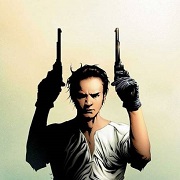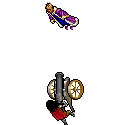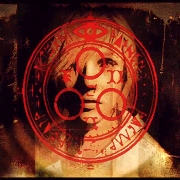|
Folio Society put out a non-limited New Sun if you missed the limited one and want a nice set. It is split into two volumes instead of four and of course not signed but also $200 instead of $600 (and now impossible to buy), same illustrations and everything.
|
|
|
|

|
| # ? May 16, 2024 20:18 |
|
Hey hey hey! The four volume signed set was only $400. EDIT: I guess it was $600? I went by what was charged to my cc, I guess I had some funds already in Paypal to cover the difference. Or $3500 if you can manage to find a set for sale today. Ornamented Death fucked around with this message at 03:21 on Feb 26, 2021 |
|
|
|
|
Some cool fan art of mr shirtless mask weirdo https://mobile.twitter.com/vor_bokor/status/1393348500453216261 https://mobile.twitter.com/deimosremus/status/1385769456312459266 https://mobile.twitter.com/deimosremus/status/1370270265612062720 I’ve noticed a real correlation between artists who are Wolfe fans and artists opposed to NFTs. Good taste carries over...
|
|
|
|
I finally began my first read through, around fifty pages in. Severian states outright that Vodalus is an eidolon, or idealized person or thing; and on the same page, that he is a figment of his imagination which leads me to believe that all interactions in which his name is invoked; so far, with the armiger girl in the clock wing of the Citadel, with the archivist with whom he has the conversation about eating the dead, and with Master Gurloes (and subsequently the Chatelaine) to be entirely imagined. He states outright in the beginning pages that memory is imperfect, and that owing to the opening sequence’s occurrence in dark and fog that he has had to fill in his memories how he chooses. The theme of self-creation seems to pervade these early chapters. There are a couple quotes so beautiful that I wrote them down: ‘Certain mystes aver that the real world has been constructed by the human mind, since our ways are governed by the artificial categories into which we place essentially undifferentiated things, things weaker than our words for them.’ Incidentally, I’ve heard this idea before but cannot remember where. Is this German idealism, Plato’s forms? ‘Many times since then, when I have stood upon a shaky platform in some marketplace square with Terminus Est at rest before me and a miserable vagrant kneeling at my feet, when I have heard in hissing whispers the hate of the crowd and sensed what was far less welcome, the admiration of those who find an unclean joy in pains and deaths not their own, I have recalled Vodalus at the graveside and raised my own blade pretending that when it fell I would be striking for him.’ His attempt to imbue his miserable life with some sort of principle beyond mere cruelty. ‘We believe that we invent symbols. The truth is that they invent us; we are their creatures, shaped by their hard defining edges.’ I have one more theory that I’d like to posit before I proceed. Severian is obsessed with two thoughts: that time is ending (owing to the death of the sun, whose death, twice stated so far, is imminent; and that there is a light which gives life to all things, is possibly the genesis of all life. I believe that Severian may have drowned, and that the death mother archetype might have claimed him early (also, he is described as essentially resembling a corpse when he’s playing in the mausoleum). Another idea I have is that the sun has been extinguished and that the entire narrative from beginning to end is a fabrication. His consciousness has perhaps been sustained by this light that gives life? Aesthetically, this is the best science fiction I’ve ever read. admittedly, I haven’t read much. after a long slog through Beckett’s three novels, I appreciate any semblance of plot, even if it is seemingly convoluted artism fucked around with this message at 03:08 on May 18, 2021 |
|
|
|
Always interesting to see someone's first time reading new sun. The first quote does remind me in some ways of the platonic forms. Plato and Augustine, specifically Augustine's thoughts on time and memory are two areas that always seemed very relevant to analysis on the novel, but never seem to be brought up. I cannot comment further without contaminating your reading experince unfortunately, even this short post is like running through a minefield.
|
|
|
|
Yes I just wanted to have my thoughts down so I can check them later. Bright light, fog and dark seem like very good indicators/symbols/motifs for the first hypothesis listed. And I don’t think this merits a spoiler, but given that Severian basically implores us to pay attention to symbols as a means by which the self is created, it makes sense to me that the novel could be nothing but self-mytholgization and glorification. Severian is prone to lying, thinks his insanity is a response to lying. Why wouldn’t he, if suspended in some weird timeless death, occupy his time creating and recreating himself? It seems highly improbable and unimportant that he becomes the king. Maybe everyone in the Citadel is dead. My understanding of Augustine’s theory of time is that it doesn’t exist except through perception. Our bodies and all things change, that doesn’t mean time passes. And memory is simply a perception because there is no past (because there is no time), just a succession of irrevocable moments. What we mean by past is essentially our present perception of self ‘then’(very hard not use a word connoting a time concept). What is meant by time is flux. I’m articulating this theory poorly, but it makes sense to me that Wolfe would’ve been intimately familiar with Augustine artism fucked around with this message at 05:57 on May 18, 2021 |
|
|
|
sebmojo posted:It's a symbolic execution, he didn't actually kill anyone. He does. With hindsight, that passage is clearly Severian decapitating her and then bringing her back to life.
|
|
|
|
That's actually one of my favorite parts of BotNS - Severian continually describes supernatural events as parlor tricks, like in the aforementioned scene where he IIRC, describes Catherine as cleverly using a fuligin cloth to make it "look" like she was beheaded, and that the "fake" head is disturbingly realistic. Eventually it comes to a head when he comes across the biggest parlor trick of all, the beach full of Claws, and mistakes it for a supernatural event. I think this is why I've been struggling with Long Sun. Silk is just too cognizant of what's going on, he's familiar with all the weird poo poo like robots and laser swords and swirly loading screen enlightenment.
|
|
|
|
I'm not well read enough to connect it to any particular school of thought, but my interpretation of the "Certain mystes aver..." and "We believe we invent symbols..." lines was that they set up a conflict between realism and nominalism, with the text landing pretty heavily on the realist side of things.
|
|
|
|
Jo Joestar posted:I'm not well read enough to connect it to any particular school of thought, but my interpretation of the "Certain mystes aver..." and "We believe we invent symbols..." lines was that they set up a conflict between realism and nominalism, with the text landing pretty heavily on the realist side of things. I think that’s close - nominalism, but the issue I have is that the quote seems to imply a universal essence or ‘thing in itself’ in Kantian terms. I’m also reading it in a Hegelian (I think it was Hegel? Been a long time) sense that we don’t differentiate things until we have the concepts to differentiate them. Then again, Severian states that things act of themselves, and that only a fool believes in the efficacy of pure knowledge, implying that things exist and can act on us without our knowledge of them. I’ll probably table this for now and just read through. Hard to trust anything which is probably the point - we get to choose what to believe in the book, just as we choose what to believe in life.
|
|
|
|
artism posted:I think that’s close - nominalism, but the issue I have is that the quote seems to imply a universal essence or ‘thing in itself’ in Kantian terms. I’m also reading it in a Hegelian (I think it was Hegel? Been a long time) sense that we don’t differentiate things until we have the concepts to differentiate them. Then again, Severian states that things act of themselves, and that only a fool believes in the efficacy of pure knowledge, implying that things exist and can act on us without our knowledge of them. I don't know Hegel, but Kant had something to say about concepts and differentiation - it's his argument against Hume's empiricism, since experience doesn't become intelligible without preexisting concepts. I think the obvious place to look here would be Catholic thought - I know that there was some debate over this (William of Ockham, of the famous razor, was IIRC a Catholic nominalist) so I might try reading up on it later. Edit: By the way, if anyone in the thread is looking for something Gene Wolfe-alike, I've just finished C.S Lewis's Till We Have Faces, which is really close - much more like Wolfe than what Lewis usually wrote, as far as I can tell. Jo Joestar fucked around with this message at 17:28 on May 18, 2021 |
|
|
|
Jo Joestar posted:I think the obvious place to look here would be Catholic thought - I know that there was some debate over this (William of Ockham, of the famous razor, was IIRC a Catholic nominalist) so I might try reading up on it later. I’ll have to check these out. I’m unfamiliar with Ockham, the scholastic method (other than nominally), nominalism... how useful an education, and more importantly, retention, of these schools of thought would be. The theme of creation continues in House Azure. I again don’t remember what philosopher first posited this idea, but I just reread Molloy, where a near-identical idea is expressed. severian chooses ‘Chatelaine Thecla’ though he knows that she is not. Captivated by her likeness, preferring the story to truth, he allows himself to go along with the fantasy. When the illusion is shattered, this time by proximity and a pink light (whereas the scenes with Vodalus and the archivist take place in fog and dark), he is bitterly disappointed and becomes violent. The ‘real’ Thecla is another eidolon, as the pretend-Thecla rightly asserts. To Severian, Thecla does not exist, only his idealized view of her that he refuses to see past. Just as I believe he does not exist, except in an exaggerated form resulting from his desire to be what his guild denies the possibility of hik becoming: a good or principled person who, like Vodalus, fights against the tyrannous cruelty of the Autarch and the various unjust institutions for the good of the people).
|
|
|
|
The text moves from solipsistic Gnostic gestures (the world as somehow unreal and a product of any loser’s mind) to Neoplatonic thought: the world as an extension of the One Source, not an illusory or arbitrary place at all. Symbols can work on us whether we know what they mean or consciously recognize it or not, transcending causality
|
|
|
|
On entities: 'No intellect is needed to see those figures who wait beyond the void of death - every child is aware of them, blazing with glories dark or bring, wrapped in authority older than the universe. They are the stuff of our earliest dreams, as of our dying visions. Rightly we feel our lives guided by them, and rightly too we feel how little we matter to them, the builders of the unimaginable, the fighters of wars beyond the totality of existence. The difficultly lies in learning that we ourselves encompass forces equally great. We... imagine ourselves our own masters, when the truth is that our masters are sleeping. One wakes within us and we are ridden like beasts, though the rider is but some hitherto unguessed part of ourselves.' (p. 110) The sand garden: Severian is drawn to the desert. I think the symbolism here is self-explanatory. Part of me is hoping that Severian becomes a Desert Father cavedweller. Octagonal speculae (mirrors)/gardens/tokoloshe: (p. 126-129) basically, light is infinitely reflected and in that reflection somehow travels faster than the speed of light... which takes the thing out of this universe and into another. Each point of reflection represents some sort of coordinate in time and space and exists there. Though so far unclear to me, this is the mechanism by which space and time travel are possible in this world. This is also what appears to be happening in the chapter titled 'The Hut in the Jungle', the memory of the story of Father Inire's 'house of presence' being triggered by the similarities between the specula there and the gardens. Severian and Agia (Death and the Lady) are transported back to the early 20th century to some deep-jungle missionary effort. Severian and Agia are perceived by Isangoma and the missionary Robert as 'tokoloshe': 'Bad spirits, Preceptor. When man think bad thought or woman do bad thing, there is another tokoloshe. But tokoloshe remain until the end of world. Then everyone will see, know what that man did.' 'Don't you see they are only the results of what we do? They are the spirits of the future, and we make them ourselves' (p. 132-3). I'm guessing that these strange beings (human?) millions of years in the future in some retrograde, primitive 'Urth' are tokoloshe. : artism fucked around with this message at 19:55 on May 22, 2021 |
|
|
|
I have just started The Wizard Knight and I am absolutely adoring it. I don't have much else to say about it right now, but it absolutely kicks rear end. I just got to the part where his dog and him are reunited after he wins a suit of armor and some horses.
|
|
|
|
Sekenr posted:I like Wolfe which doesn't mean that every word he wrote is great. The further the series goes, the worse in my view hes prose becomes, like he is paid by the word. Happenings are unnecessarily encrypted like it became a habit rather than adding aesthetical or plain enjoyment value, dialogues unnecessarily wordy and coy. I love everything he wrote up to a point (~1989) and dislike everything after that, it's extremely binary. sebmojo fucked around with this message at 10:12 on May 24, 2021 |
|
|
|
Finished the first book, made a not insignificant dent into the second On time clearly this world is not fixed in any one present, owing perhaps to Inire’s presence chamber and devices like it. Several characters state that they come from the future, such as the photosynthetic green man from whom Severian receives an augury, and the previously mentioned missionaries from the early 20th century. There’s a sort of pervasive ‘allness’; of religion (pantheism, as evinced by the names for priests drawing from many different tradition, of military tradition, of creatures with direct reference to several formerly-extinct prehistoric creatures. Severian at some point alludes to the Buddhist/Augustinian notion of time, specifically the past, existing only in the mind. Nothing to report other than I found it interesting On the Pancreator/Increate This smacks of Gnosticism. Pancreator, or creator of all; Increate, or not yet created, who I believe is referenced as the Demourge, whose prophesied fo bring about the new sun. I’m inclined to believe that this is Seeverian, who will use the claw, or ‘the miraculous light... that [engenders] life’ to accomplish it Literal/Symbolic/Teleological(or Theological) interpretation After Severian and Dorcas (Innocence) (Cas from the garden of eternal sleep? Who is resurrected from death after Severian nearly drowns the second time) see the image of a Castle rising above Nessus, Severian relates the following discussion he had with Thecla: ‘... everything, whatever happens, has three meanings. The first is its practical meaning... The second is the reflection of the world about it... That might be called the soothsayers’ meaning [the symbolic, as a soothsayer is naught but an interpreter of synbols]... The third is the trans substantial meaning. Since all objects have their origin in the Pancreator, and all were set in motion by him, so all must express his will - which is the higher reality’ I think Wolfe is imploring us to read this book in this vein (vain?). Talos’ Play The play is deliberately inscrutable, as far as the literal interpretation. Symbolically, Strength, Courage and Vice as represented by Baldanders overwhelm Death as represented by Severian. Innocence is tortured, Deception and Mystery are suppressed. Beauty is more or less ignored. I don’t know, really. The marshal virtues are most prized by Severian; perhaps he will become a vengeful Increate. Also, Hethor’s long, lengthy and ludicrously garbled speech about the virtues of torture, fear and justice. No theories, just very cool. Get the man an account artism fucked around with this message at 04:16 on May 27, 2021 |
|
|
|
Hethor is v cspam
|
|
|
|
I'm pretty sure Wolfe wrote Talos' play first, submitted it to his editor, was reminded that he got paid by the word, then set about repeating himself until he had four novels. Then his editor said, "Could you repeat yourself once more? We don't get it."
|
|
|
|

|
|
|
|
Anybody have trouble getting into peace? I've tried twice before and always jumped a couple chapters in. Now the gene Wolfe podcast have hit it and I want to get the drat thing finished. Ive had trouble getting into his works before but never this bad.
|
|
|
|
Honestly, Peace was immediately engaging to me and I almost read the entire thing in one sitting, so it's hard for me to say much. One thing that might help is to highlight or jot down the names and descriptions of people Weer mentions. You don't need to keep track of it as such, just consider certain characters as they're mentioned in different contexts. It also helps to keep track of where you are in Weer's memories, just to know "okay, this story is happening at around this point in time."
|
|
|
|
Gaius Marius posted:Anybody have trouble getting into peace? I've tried twice before and always jumped a couple chapters in. Now the gene Wolfe podcast have hit it and I want to get the drat thing finished. I found Peace to be a bit disjoined and difficult to follow too. I enjoyed it by the time I got through it.
|
|
|
|
Just picked up the single volume Wizard Knight book for a friend. Has anyone read Book Of Knights by Yves Menard? He wrote the new foreword for the Wizars Knight anthology but I'm not familiar with works.
|
|
|
|
I generally love Wolfe's writing, but after just reading On Blue's Waters for the first time, i gotta say i am extremely done with his naive waifish lady companions and all the raping that happens to them, at the hands of protagonists or otherwise. Besides that, the book seems a bit of a step backwards after the rich cosmogony of the Long Sun. I hope the next two books go somewhere better.
|
|
|
|
|
Osmosisch posted:I generally love Wolfe's writing, but after just reading On Blue's Waters for the first time, i gotta say i am extremely done with his naive waifish lady companions and all the raping that happens to them, at the hands of protagonists or otherwise. It definitely goes places after On Blue's Waters though.
|
|
|
|
Even after having reread it now I'm not sure On Blue's Waters clicks with me. I'd be interested in Short Sun advocates explaining what they like about that one. But yeah In Green's Jungles might be my favorite Wolfe book across Wolfe books. I cannot stop grinning like an idiot and occasionally flailing jazz hands every time I read it. It's basically just people sittin' around chatting and it turns out that's what I like. I should take up reading stage play scripts or something. Return to the Whorl is solid, definitely better the second time, though my two reads of it were I Have No Idea What's Happening and Yeah I Think I Got Everything.
|
|
|
|
Do any of Wolfe's non-BOTNS works have good audiobooks to them? Long Sun is on some pretty awful-sounding cassette tapes but I wouldn't mind one of his other books in my ears for those times I'm feeling wolfe-y. For those looking for an excuse to re-read BOTNS, the Jonathan Davis reads are great. You probably won't be able to retain nearly as much of the discreet information, but his voice-over is very comforting and I found his read very fitting for Severian's narration and reflection on his world.
|
|
|
|
|
Apparently there are like 5 different recordings of the Wizard Knight at this point. I stumbled across the one which was made for some library as part of some disabilities act and found it quite enjoyable, though I think I've heard others espouse some more recent recording as better.
|
|
|
|
I can't imagine absorbing Wolfe via audiobook unless it was comparatively lighter fare like Devil in a Forest. He trashed the idea of his books being put to tape in a fan interview once. Something like "I write books to be read, not listened to. Books can be read to children but I write my books for adults."
|
|
|
|
Lol, that's a pretty dickheaded thing of him to say. I reckon it's from a time before everyone had rectangles in their pockets they could listen to at any time, but you'd think an author would be into sight-impaired people reading their books, even if it's "compromised." For my part, my retention from reading and listening is about the same, likely owing to years of tedious jobs where I listened to audiobooks for eight hours a day. I get how that might be sub-optimal if you're the type to get into it at ReReading Wolfe levels, but at that point then I don't understand how you read Wolfe without a cork board and lots of red yarn.
|
|
|
|
|
Retention of what happened, sure. But with audiobooks you rarely have time to think about, let alone reread, a compelling sentence or paragraph. Idk, I understand why someone so allusive would dismiss audio conversion
|
|
|
|
Gene wolfe is basically novelist Ron swanson
|
|
|
sebmojo posted:Gene wolfe is basically novelist Ron swanson Wolfe books are basically the Dark Souls of reading, using your ears means you're cheating not only the game but yourself
|
|
|
|
|
Osmosisch posted:Gene Wolfe: these books are basically the Dark Souls of reading
|
|
|
|
Elden ring woulda been better if gene Wolfe had wrote the lore and not gurm
|
|
|
|
Gaius Marius posted:Elden ring woulda been better if gene Wolfe had wrote the lore and not gurm Let's be real Elden Ring is never coming out I couldn't help but hear the Dark Souls *dunk* sound effect whenever new locations were mentioned in Shadow. The Bitter Gate, The Sanguinary Fields, etc. BOTNS and Dark Souls aren't bad companion pieces in terms of tone and deliberate obscurantism
|
|
|
|
From will transform Grrm into Wolfe
|
|
|
|
MeatwadIsGod posted:Let's be real Elden Ring is never coming out They really really are perfect together, whereas Gurm is all tax policy "Gritty" bullshit, when the fucker doesn't understand the first thing about medieval society.
|
|
|
|

|
| # ? May 16, 2024 20:18 |
|
Going back through Peace I can see how it can be difficult to get into initially, as the first chapter is all over the place, it takes a while to get a handle on how Weer discusses his own life, and the meaning of some of his childhood stories doesn't become clear until much later. It really starts to pick up once he starts talking about living with Olivia and her suitors, and the chapter about Julius Smart and the pharmacist in Florida is so bizarrely compelling. A lot of the other (seemingly) digressive stories in the novel are interesting in their own right, but there's something distinctly unsettling about a weird modern American ghost story, with the strange behavior and the carney customers and all of that.
|
|
|



























